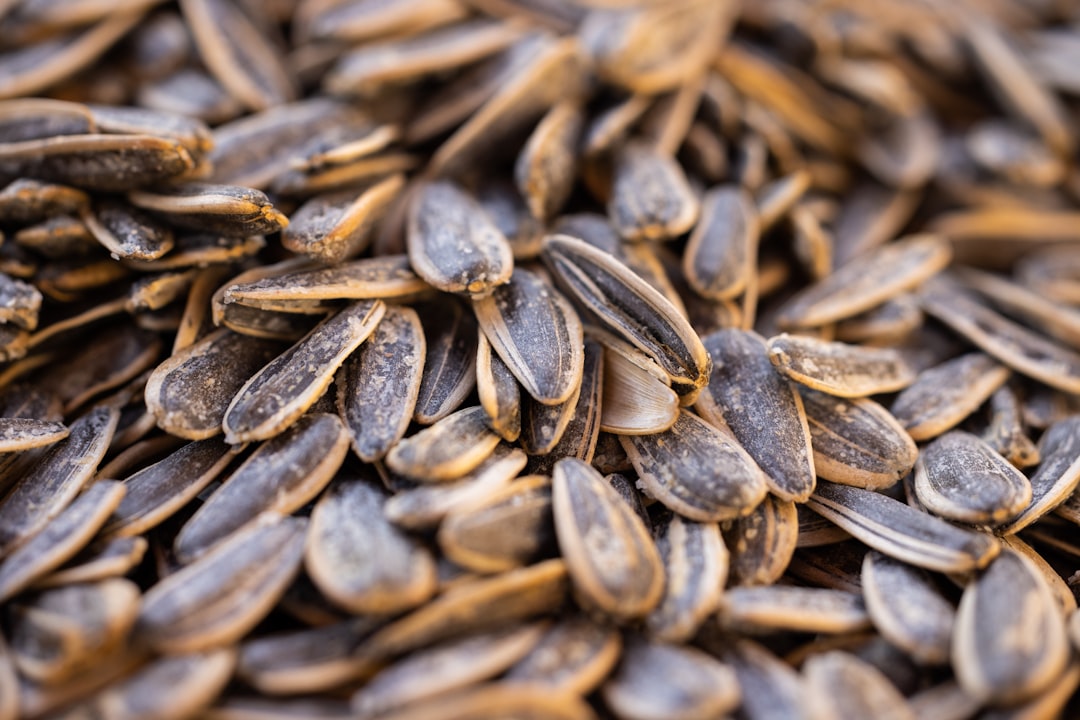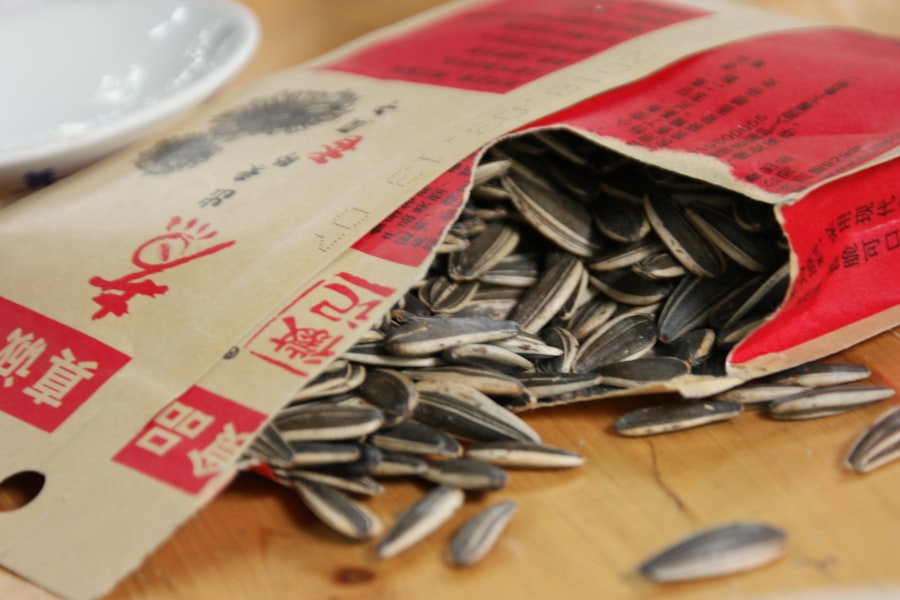Sunflower Seeds: The Secret to a Beautiful Flower

Sunflower seeds have a long and fascinating history, dating back thousands of years. They are believed to have originated in North America, where they were cultivated by Native American tribes for their nutritional and medicinal properties. The seeds were highly valued for their versatility and were used in various ways, including as a food source, oil, and even as a dye for textiles.
Today, sunflower seeds are enjoyed all over the world and are known for their distinct nutty flavor and crunchy texture. There are two main types of sunflower seeds: black oil sunflower seeds and striped sunflower seeds. Black oil sunflower seeds are larger and have a higher oil content, making them popular for oil production. Striped sunflower seeds, on the other hand, are smaller and have a thinner shell, making them easier to eat.
Key Takeaways
- Sunflower seeds are a nutritious and versatile food that can be enjoyed in many ways.
- They are a good source of protein, healthy fats, and important vitamins and minerals.
- Sunflower seeds can benefit skin and hair health, and can be grown in a variety of settings.
- Different varieties of sunflower seeds are suited to different purposes, from snacking to oil production.
- Sunflower seeds can be used in a range of culinary applications, and their oil is a healthy alternative to other cooking oils.
Nutritional Value of Sunflower Seeds
Sunflower seeds are packed with essential nutrients that contribute to overall health and well-being. They are an excellent source of macronutrients such as protein, healthy fats, and dietary fiber. In addition, they contain a wide range of micronutrients including vitamin E, magnesium, selenium, copper, and zinc.
One of the key health benefits of consuming sunflower seeds is their high vitamin E content. Vitamin E is a powerful antioxidant that helps protect cells from damage caused by free radicals. It also plays a crucial role in maintaining healthy skin and hair. Sunflower seeds are also rich in magnesium, which is important for bone health, muscle function, and energy production.
Benefits of Sunflower Seeds for Skin and Hair
The vitamin E content in sunflower seeds makes them particularly beneficial for skin and hair health. Vitamin E is known for its ability to nourish and moisturize the skin, helping to keep it soft and supple. It also has anti-inflammatory properties that can help soothe irritated skin and reduce redness.
In addition to vitamin E, sunflower seeds contain other antioxidants such as selenium and copper, which help protect the skin from oxidative stress and promote a youthful appearance. These antioxidants also play a role in maintaining healthy hair by preventing damage to the hair follicles and promoting hair growth.
How to Grow Sunflowers from Seeds
| Step | Description |
|---|---|
| 1 | Choose a sunny location with well-draining soil. |
| 2 | Prepare the soil by removing weeds and adding compost. |
| 3 | Sow sunflower seeds directly into the soil, spacing them 6 inches apart. |
| 4 | Water the seeds regularly, keeping the soil moist but not waterlogged. |
| 5 | Thin the seedlings to one plant every 2 feet once they reach 6 inches tall. |
| 6 | Fertilize the sunflowers every 2-3 weeks with a balanced fertilizer. |
| 7 | Stake the sunflowers if they become top-heavy or are in a windy location. |
| 8 | Harvest the sunflower seeds once the flower heads have dried and turned brown. |
If you’re interested in growing your own sunflowers, it’s relatively easy to do so from seeds. Here are the steps to planting and growing sunflowers:
1. Choose a sunny location: Sunflowers thrive in full sun, so choose a spot in your garden that receives at least six hours of direct sunlight per day.
2. Prepare the soil: Sunflowers prefer well-draining soil, so make sure the soil is loose and fertile. You can amend the soil with compost or organic matter to improve its quality.
3. Plant the seeds: Plant the sunflower seeds directly into the soil, about 1-2 inches deep and 6-12 inches apart. Water the seeds thoroughly after planting.
4. Water and fertilize: Keep the soil consistently moist but not waterlogged. Once the seedlings emerge, you can fertilize them with a balanced fertilizer every few weeks to promote healthy growth.
5. Provide support: As the sunflowers grow taller, they may need support to prevent them from toppling over. You can use stakes or trellises to provide support for the plants.
6. Harvesting: Sunflowers typically bloom in late summer or early fall. You can harvest the seeds once the flower heads have dried out and turned brown. Cut off the flower heads and hang them upside down in a cool, dry place to allow the seeds to fully dry.
Sunflower Seed Varieties for Different Purposes
There are different types of sunflower seeds available, each with its own characteristics and uses. Here are some of the main varieties:
1. Eating sunflower seeds: These are the most common type of sunflower seeds that are consumed as a snack. They have a black and white striped shell and a mild, nutty flavor.
2. Birdseed sunflower seeds: These seeds are smaller and have a thinner shell, making them easier for birds to crack open. They are often used in bird feeders to attract a variety of bird species.
3. Oilseed sunflower seeds: These seeds have a high oil content and are primarily grown for oil production. The oil extracted from these seeds is commonly used for cooking, baking, and salad dressings.
Harvesting and Storing Sunflower Seeds

Harvesting sunflower seeds is a simple process that can be done once the flower heads have dried out and turned brown. To harvest the seeds, cut off the flower heads using a sharp knife or shears. Hang the flower heads upside down in a cool, dry place to allow the seeds to fully dry.
Once the seeds are dry, you can remove them from the flower heads by rubbing them gently with your hands or using a fork to loosen them. It’s important to store the seeds properly to maintain their freshness. Place the seeds in an airtight container or resealable bag and store them in a cool, dark place such as a pantry or refrigerator.
Culinary Uses of Sunflower Seeds
Sunflower seeds can be incorporated into a wide range of meals and snacks, adding a delicious crunch and nutty flavor. Here are some ways to use sunflower seeds in your culinary creations:
1. Snacks: Sunflower seeds make a great standalone snack and can be enjoyed on their own or mixed with other nuts and dried fruits for a homemade trail mix.
2. Salads: Sprinkle sunflower seeds on top of salads for added texture and flavor. They pair well with leafy greens, vegetables, and creamy dressings.
3. Baking: Sunflower seeds can be used in baking to add a nutty flavor and texture to bread, muffins, cookies, and granola bars. They can be added to the batter or sprinkled on top before baking.
4. Smoothies: Add a tablespoon of sunflower seeds to your favorite smoothie for an extra boost of protein and healthy fats.
Sunflower Seed Oil: A Healthy Alternative
Sunflower seed oil is a popular cooking oil that is known for its mild flavor and high smoke point. It is rich in vitamin E and other antioxidants, making it a healthier alternative to other cooking oils. Here are some of the nutritional benefits of sunflower seed oil:
1. Heart health: Sunflower seed oil is low in saturated fat and high in monounsaturated fats, which have been shown to help reduce LDL cholesterol levels and lower the risk of heart disease.
2. Skin health: The vitamin E content in sunflower seed oil makes it beneficial for skin health. It can help moisturize the skin, reduce inflammation, and protect against damage caused by free radicals.
3. Cooking versatility: Sunflower seed oil has a high smoke point, which means it can withstand high heat without breaking down and producing harmful compounds. This makes it suitable for frying, sautéing, and baking.
4. Nutritional profile: Sunflower seed oil is a good source of vitamin E, omega-6 fatty acids, and other essential nutrients. It also contains phytosterols, which have been shown to help lower cholesterol levels.
Sunflower Seeds in Traditional Medicine
Sunflower seeds have been used in traditional medicine for centuries due to their various health benefits. In ancient times, they were believed to have healing properties and were used to treat ailments such as respiratory conditions, digestive issues, and skin problems.
Modern research has shed light on the potential health benefits of sunflower seeds. Studies have shown that the antioxidants found in sunflower seeds, such as vitamin E and selenium, can help reduce inflammation, protect against chronic diseases, and support overall health and well-being.
Sunflower Seeds for a Beautiful Life
In conclusion, sunflower seeds are not only delicious but also packed with essential nutrients that promote health and vitality. From their rich vitamin E content to their potential benefits for skin and hair health, sunflower seeds offer a wide range of advantages.
Whether you choose to enjoy them as a snack, incorporate them into your meals, or use sunflower seed oil in your cooking and skincare routine, there are countless ways to incorporate sunflower seeds into a healthy lifestyle. So why not start reaping the benefits of these tiny powerhouses today?
If you’re interested in learning more about sunflower seeds and their fascinating connection to the flower itself, you might want to check out this informative article on Lawn World’s website. They have a wide range of resources dedicated to all things related to lawns and gardening. In fact, their sitemap provides a comprehensive overview of the various topics covered on their site, including an entire section on flowers. So, if you’re curious about sunflower seeds and want to delve deeper into the subject, be sure to explore their website for valuable insights and tips. Click here to visit Lawn World’s sitemap and discover more about sunflower seeds and other fascinating topics in gardening.
FAQs
What are sunflower seeds?
Sunflower seeds are the edible seeds of the sunflower plant. They are commonly used as a snack and in cooking.
How are sunflower seeds harvested?
Sunflower seeds are harvested by cutting the flower head from the plant and allowing it to dry. The seeds are then removed from the flower head.
What are the health benefits of sunflower seeds?
Sunflower seeds are a good source of protein, fiber, and healthy fats. They also contain vitamins and minerals such as vitamin E, magnesium, and selenium.
Can sunflower seeds be planted to grow sunflowers?
Yes, sunflower seeds can be planted to grow sunflowers. They should be planted in well-draining soil and in a location that receives full sun.
What are some ways to eat sunflower seeds?
Sunflower seeds can be eaten raw or roasted. They can also be added to salads, baked goods, and trail mix. Sunflower seed butter is also a popular alternative to peanut butter.
Are there any potential risks to eating sunflower seeds?
Some people may be allergic to sunflower seeds. Additionally, sunflower seeds are high in calories and should be consumed in moderation as part of a balanced diet.



